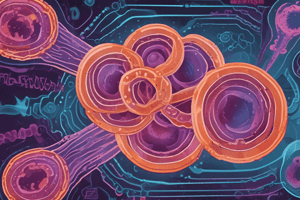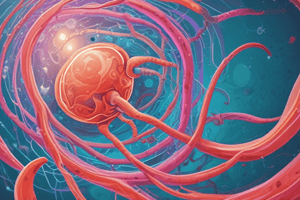Podcast
Questions and Answers
What is the primary habitat of Pneumocystis jiroveci?
What is the primary habitat of Pneumocystis jiroveci?
- Rodents and other small mammals
- Birds and other avian species
- Domestic animals such as horses and sheep (correct)
- Humans, particularly those with immunocompromised systems
What is the primary mode of transmission of Pneumocystis jiroveci?
What is the primary mode of transmission of Pneumocystis jiroveci?
- Inhalation of spores (correct)
- Direct contact with infected animals
- Vector-borne transmission
- Contaminated food and water
What is the characteristic inflammatory response to Pneumocystis jiroveci infection?
What is the characteristic inflammatory response to Pneumocystis jiroveci infection?
- Neutrophilic response with abscess formation
- Eosinophilic response with granuloma formation
- Plasma cell response with frothy exudate (correct)
- Lymphocytic response with granuloma formation
What is the primary site of infection for Pneumocystis jiroveci?
What is the primary site of infection for Pneumocystis jiroveci?
What is the typical radiographic finding in Pneumocystis jiroveci pneumonia?
What is the typical radiographic finding in Pneumocystis jiroveci pneumonia?
What is the typical laboratory diagnosis of Pneumocystis jiroveci?
What is the typical laboratory diagnosis of Pneumocystis jiroveci?
What is the mortality rate of untreated Pneumocystis pneumonia?
What is the mortality rate of untreated Pneumocystis pneumonia?
What is a common complication of Pneumocystis jiroveci infection in patients with AIDS?
What is a common complication of Pneumocystis jiroveci infection in patients with AIDS?
Flashcards are hidden until you start studying
Study Notes
Pneumocystis jiroveci
- Important cause of pneumonia in immunocompromised individuals
- Morphology: appears as a cyst
- Found in domestic animals (horses, sheep) and rodents, with each mammalian species having its own species of Pneumocystis
Life Cycle and Transmission
- Life cycle of Pneumocystis is unclear
- Transmission occurs through inhalation
Infection and Pathology
- Infection primarily occurs in the lungs, inducing an inflammatory response with plasma cells
- Results in a frothy exudate that blocks oxygen exchange, leading to "plasma cell pneumonia"
- Pneumonia occurs when host defenses are reduced, such as with low CD4-positive T cells
Clinical Findings
- Sudden onset of fever
- Nonproductive cough
- Dyspnea and tachypnea
- Bilateral rales and rhonchi are heard on auscultation
- Chest X-ray shows diffuse interstitial pneumonia with "ground glass" infiltrates bilaterally
Extrapulmonary Infections
- Occur in late stages of AIDS, affecting primarily the liver, spleen, lymph nodes, and bone marrow
Mortality and Diagnosis
- Mortality rate of untreated Pneumocystis pneumonia approaches 100%
- Laboratory diagnosis involves:
- Specimen: lung tissue or fluids obtained by bronchoscopy, bronchial lavage, or open lung biopsy
- Microscopic examination with methenamine silver or Giemsa stain to identify typical cysts
- Fluorescent-antibody staining
- PCR
- No serologic test available, and the organism cannot be grown in culture
Studying That Suits You
Use AI to generate personalized quizzes and flashcards to suit your learning preferences.



